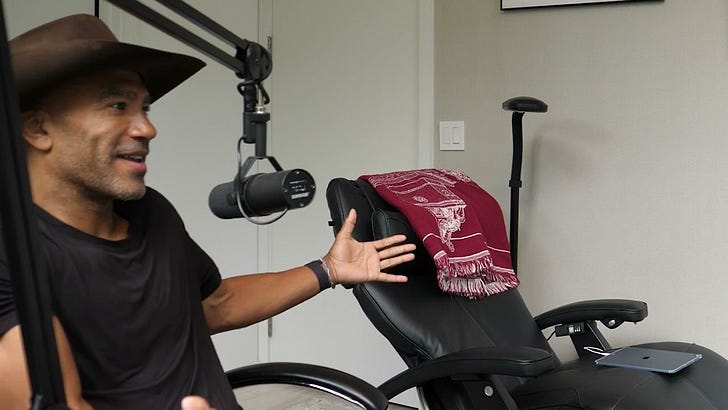Risk Management and Bill Perkins's Die with Zero
Many of my poker contemporaries favor Expected Value and/or Kelly Criterion as a way of thinking about risk and reward. Perhaps the biggest problem of these approaches is that they assume you know your edge.
The best risk thinkers, in my view, express extreme skepticism that anyone knows anything about the future.
Poker player Tom Dwan once told me, “Most people go through life making huge gambles that they don’t know they’re making.”
Nassim Taleb, in his brilliant volumes on risk, argues for a barbell approach to risk. He argues for a strategy of Treasuries + lottery tickets. Aaron Brown, in Red-Blooded Risk, argues similarly — you want a safe core, coupled with some positive expectation, high-risk plays (these are your lottery tickets).
Bill Perkins, in Die with Zero and in a podcast interview with me last month, favors an extreme version of the barbell approach to risk that I find extremely compelling.
On one hand, Bill has a portfolio of very aggressive investments, including angel investments, his own start-ups, and commodity speculations. He has nothing of middling risk (ie large S+P exposure). He balances his very aggressive portfolio with an ultra safe “portfolio” of a life annuity and long-term care insurance. His logic for this is:
An annuity (which pays a guaranteed monthly income for every year you’re alive, starting at some future date) is a bet on yourself. Your payout is higher if you survive longer. This makes you want to invest in health.
An annuity removes the number one anxiety that people have about retirement (ie outliving their money).
An annuity removes the risk that you make a mistake in evaluating risky portfolios (many underestimate the risk of having a devastating drawdown at the wrong time).
Long-term care insurance insures against bad late-life health outcomes like strokes or Alzheimer’s that require years of expensive care.
The “cost of an annuity” — which can be thought of as the insurer’s profit, or, what you would lose relative to a theoretical optimal portfolio that you ran on your own — is outweighed by the benefits of peace of mind and mistake avoidance.
The Treasuries + lottery tickets approach means that your dumb mistakes don’t kill you. You don’t want your bad assessment of risky gambles to be catastrophic.
My friend Nikolai Yakoshenko had an incredible Twitter thread on this topic last week.
Might get flamed for speculation without being certain… but from what I’ve read about this crypto unwinding, funds blowing up… a lot to it but sounds like small funds without industry standard central risk team — as you would have at any large hedge fund. 1/n
When I was at a large multi manager hedge fund, not much I can say but we had a central risk team. Every PM had to talk to central risk, and their positions were being tracked by a separate team looking pretty much only at worst case scenarios. 2/n
Nassim Taleb actually has great chapters about risk, and the personality of traders vs risk managers, in his great early books. 3/n
Truth is, nobody is really good enough to trade a book, and manage is own risk too. Unless you’re a quant maybe. Or in general doing short term trades and going flat every day or fairly often. 4/n
Say you’re at a hedge fund, you short memes stocks, and you *know* the price will come around, eventually… well you still need someone to come in and give you a stop loss. To tell you when you need to reduce. 5/n
It doesn't matter if your trading model tells you the market will move in your favor tomorrow. Of course "central risk" also uses models. But you can't use the same models to predict returns, and estimate risk. Or even the same people. 6/n
That, or you need a central risk team building a "risk book" -- basically an insurance policy that's anti-correlated to your market trading. A few funds famously killed it in early Covid via asymmetric insurance bets. 7/n
But either way you can't have a multi-billion portfolio and no risk management. Or a risk model that's contaminated by your alpha models, or just an afterthought. Not saying I know for sure that's what happened... 8/n
Never rooting for anyone to collapse, but gotta read early Taleb books, take 'em to heart. Traders who crush in normal/bull markets, need a different personality, ie a risk manager, to protect them from themselves. Especially when taking large, long term positions. 9/end
The crucial excerpts here are: “Truth is, nobody is really good enough to trade a book, and manage is own risk too” and “But you can't use the same models to predict returns, and estimate risk. Or even the same people.”
Overconfidence is a killer.
Edward Thorp’s A Man for All Markets is a favorite of mine. In his recent podcast appearance with Tim Ferriss, I was a bit surprised to find that his risk thinking is highly conventional (he thinks that most people should load up on as much SPY exposure as they can possibly tolerate). It was good advice for his generation.



